|
By: Ric Hudgens 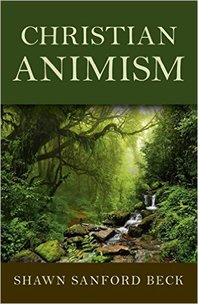 Shawn Sanford Beck’s short, suggestive essay (60 pages) on “Christian animism” is a provocative delight. I want to highlight some of his most salient points and indicate some further directions for those who want to go further. The Rev Shawn Sanford Beck is a priest in the Anglican Church of Canada. He lives with his family on an off-the-grid homestead in Saskatchewan. Beck writes:“To say that a Christian can, and should, cultivate a relationship with the spirits of nature, the spirits of the land, is something new. What was natural and somewhat unconscious up until the end of the medieval period now requires consciousness and intentionality.” But can’t we do that without calling it “Christian animism”? Beck argues that we need not fear animism, nor should we see the conjunction of Christian and animist as something so foreign or idiosyncratic. Christian animism according to Beck is “what happens when a committed Christian engages the world and each creature as alive, sentient, and related, rather than soul-less and ontologically inferior.” Christian Animism seems so exotic and frankly eccentric because we have all been indoctrinated into a “cult of reductionism” that reduces the world’s wondrous multiplicity to a series of justs: just a tree, just a rock, just the earth. In my own initial writing about Christian Animism I noted how the voices of creation have been bound and gagged by modernity so that only the human voice can be heard.
Comments
12/27/2015 Comments Where can anger live?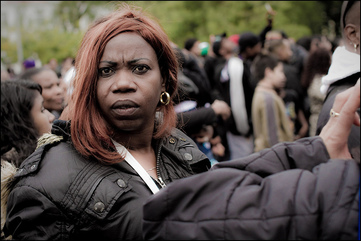 "Now what?" by Elvin. (Flickr/Creative Commons) "Now what?" by Elvin. (Flickr/Creative Commons) By: Austin Channing Editorial note: This post was originally published on www.austinchanning.com My friend made plans to come over. Before she arrived, she sent me a text warning me that the "well-meaning" white folks at her para-ministry job made her especially mad that day. She then added, "I hope my anger will wear off by the time I arrive." Without thinking about it I replied, "Your anger is welcome here". As I thought more about her concern of carrying the anger with her, I tried to think of places where our anger is truly welcome. It's generally not safe to be angry at work- even if there is good reason to be. It's certainly not safe to be angry at church- violating the unspoken rules of niceness, politeness, graciousness and forgiveness. To be angry at school is often invalidated or dismissed altogether. I remember often being asked, "If you are so angry here, why not just go to another school?" So where can we be angry? By: Joanna Shenk Note: Originally published at Geez Magazine 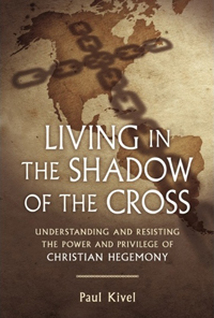 Living in the Shadow of the Cross: Understanding and Resisting the Power and Privilege of Christian Hegemony by Paul Kivel New Society Publishers, 2013 What do post-Christendom and the “War on Christmas” have in common? They both acknowledge that Christian authority is being challenged in the Western world. For the post-Christendom camp this is a welcome change, since Christianity has been severely compromised due to its collusion with empire throughout history. For those concerned about the War on Christmas, it is an affront to their faith and their understanding of what it means to live in the United States. In his book Living in the Shadow of the Cross: Understanding and Resisting the Power and Privilege of Christian Hegemony, Paul Kivel challenges readers to deepen their analysis. Deeper than post-Christendom and the War on Christmas is the massive system of Christian hegemony. Whereas the former ways of thinking acknowledge that norms are shifting, an awareness of Christian hegemony unmasks the framework that created and perpetuates the norms. By: Brett Gershon 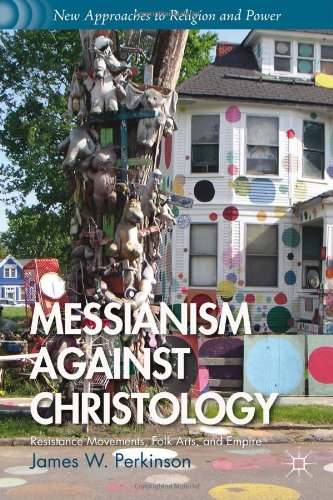 New hope is growing in places of abandonment as tendrils taking back what has been subsumed by so much concrete. While large scale urban abandonment in places like St. Louis, Baltimore, and Detroit has led to conditions of crushing poverty, fragmented family-life, and bleak, inhospitable cityscapes and living conditions for those abandoned there and with no means to escape, new possibilities of life are also opening that defy the present order. For so many of us caught in the thrall of the encroaching planetary crisis (like deer in headlights), not knowing where to turn and feeling sometimes ourselves simultaneously coaxed into a dull passivity and desperately abandoned to be consumed by the appetites of the powerful, the crumbling urban center stands as both sign of ruin to come and beacon of hope and possibility. James W. Perkinson’s latest book, Messianism, Against Christology: Resistance Movements, Folk Arts, and Empire (Palgrave Macmillan, 2013) is contained within the deteriorating and vacant yet vibrant and bursting with life cityscape of urban Detroit as a road into what will be defined as “messianism”: the spirit of resistance which counters heinous and inappropriate systems of death with creative opening of new possibilities for life. Messianism breaks these possibilities wide open through the engaging of imagination and invocation of memory of prior ways of being more viable and in step with the rhythms of creation through folk mediums (storytelling, song, dance, etc.) and through embodying those memories in creative action. The spirit of messianism and the new possibilities it engenders occur under the influence and charisma of one who refuses to be contained by and who galvanizes a following against hegemonic control and into alternative economies based on reciprocity and more egalitarian lifeways. It is a sort of artful defiance that exists under any socio/political/economic order which counters oppressive power with creative energy and compassion. 8/22/2011 Comments Book Review: CaptivityBy: Christopher Knestrick 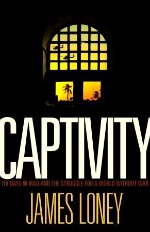 Captivity: 118 days in Iraq and the Struggle for a World without War by James Loney, a member of the Christian Peacemaker Teams (CPT) and a Catholic Worker is a great book for anyone seeking to create peace and justice in this world. The book is the story of when James Loney and three other Christian Peacemaker Teams members, Tom Fox, Harmeet Singh Soode, and Norman Kember, were kidnapped in Iraq while participating in a delegation and held for 118 days. It is a book about humanity in all its paradoxes—a humanity that searches for freedom and forgiveness in the midst of war. The Christian Peacemaker Teams started in 1986 with a question, “What would happen if Christians devoted the same discipline and self sacrifice to nonviolent peacemaking that armies devoted to war?” Struggling to live out this question, CPT began to ally with local nonviolent peacemakers around the world who are risking their lives to bring peace and justice to their communities. Today, CPT has teams in Colombia, Iraq, Palestine, and Canada. By: Frank Cordaro 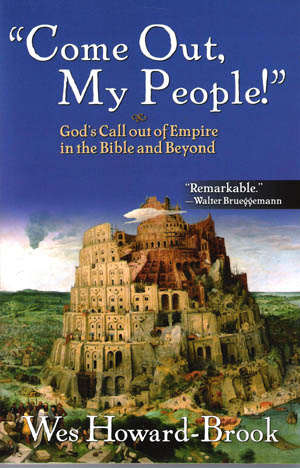 I have wanted to read this book for many years. It just was not written yet. Now that it is, we Catholic Workers and faith-based-nonviolent-resistance-to-the-USA-Empire type folks owe Wes Howard-Brook a debt of gratitude. Not since reading Ched Myers’s ground-breaking Binding the Strong Man has a book so influenced my reading of the scriptures. What Myers did with the Gospel of Mark, Howard-Brook does for the whole Bible by laying out a template for reading it. Come Out, My People! addresses two major issues that have plagued my reading of the Bible. The first is the seeming great divide between the New and Old Testaments, or what we Christians have called our “Jewish question.” James Carroll’s book Constantine’s Sword, documents this tragic misreading of the scriptures and the bloody history that has followed. The current political discourse surrounding the State of Israel shows that these issues are still very much with us and not going away anytime soon, My second issue surrounds the question of violence in the Bible. Jack Nelson-Pallmeyer’s book Jesus Against Christianity highlights this perplexing issue well. Nelson-Pallmeyer asks the question, how are we who believe in the nonviolent Jesus and the unconditionally loving God of unlimited forgiveness with the violent deeds attributed to God and God’s people in the Bible? Nelson-Pallmeyer‘s answer is a bold and liberating one. If we really believe in that Jesus and that God, then where ever God is portrayed as violent in both the New and Old Testaments, the violence is human pathology imposed on the text. I find Nelson-Pallmeyer’s answer very appealing. It rings true in my spiritual guts. Yet it is somehow too convenient, too easy a solution. It does not adequately or systematically deal with the Bible’s violent biblical texts. By: Michael Iafrate 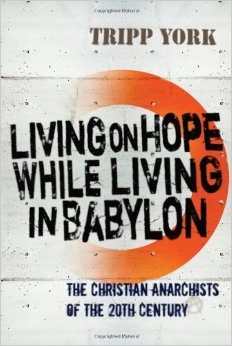 The publication of Tripp York’s Living on Hope While Living in Babylon marks a significant contribution to the recently re-emerging interest in the connection between Christianity and anarchism and for that reason should be celebrated. Very little scholarship exists regarding these questions, and the less these concerns remain marginal to political theology the better. The book is a revised version of York’s master’s thesis on anarchism and Christianity. Chapter one describes why Christianity and anarchism resonate with one another. Chapter two seeks to go beyond what York calls a merely “revolutionary” type of Christian anarchism toward what he calls an anarchistic “apocalyptic politics.” Chapters three through five each describe Christian individuals or movements whose praxis subverted the “triple axis of evil” of imperial politics described by Martin Luther King, Jr.: materialism, racism, and militarism. These chapters focus, respectively, on the Catholic Worker movement, Clarence Jordan of the Koinonia movement, and the Berrigan Brothers. By: Michael Iafrate 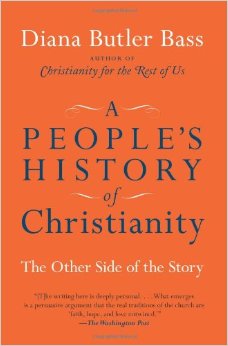 The title of Diana Butler Bass’ new book, A People’s History of Christianity, immediately grabbed my attention, as I am a pretty big fan of Howard Zinn. Indeed, Bass’ book is billed as an attempt to write church history “in the same spirit” as Zinn’s A People’s History of the United States. With this kind of title and marketing strategy, Bass is likely to attract a lot of readers. The difficult part, though, of modeling a book after such a classic work is that readers and reviewers have no choice but to evaluate the book in light of the original. More specifically, Bass intends to respond to our “posttraditional” situation in which different factions of the church each suffer from their own brand of collective amnesia: conservatives have forgotten the ethical impulse of historic Christianity and progressives/liberals have forgotten the devotional roots of that ethical impulse. Each chapter, then, strives to highlight the devotional and ethical practices of various moments in the church’s history through the narration of the “subversive” and “alternative” stories of ordinary Christians, sidestepping the usual account of “Big-C” Christian history (“Christ, Constantine, Christendom, Calvin and Christian America”) in favor of a more radical, socially engaged story of what Bass calls “generative Christianity.” If this sounds like a big job, it is. Zinn needed close to 700 pages to cover the 200 year history of the united states. The identically-titled scholarly version of A People’s History of Christianity, edited by Richard Horsley, spans seven volumes. That Bass squeezed her people’s history into 300 pages of 13-point font type made me a little skeptical of how much it could possibly cover. |
Disclaimer
The viewpoints expressed in each reader-submitted article are the authors own, and not an “official Jesus Radicals” position. For more on our editorial policies, visit our submissions page. If you want to contact an author or you have questions, suggestions, or concerns, please contact us. CategoriesAll Accountability Advent Anarchism Animal Liberation Anthropocentrism Appropriation Biblical Exegesis Book Reviews Bread Capitalism Catholic Worker Christmas Civilization Community Complicity Confessing Cultural Hegemony Decolonization Direct Action Easter Economics Feminism Heteropatriarchy Immigration Imperialism Intersectionality Jesus Justice Lent Liberation Theology Love Mutual Liberation Nation-state Nonviolence Occupy Othering Pacifisim Peace Pedagogies Of Liberation Police Privilege Property Queer Racism Resistance Resurrection Sexuality Solidarity Speciesism Spiritual Practices Technology Temptation Veganism Violence War What We're Reading On . . . White Supremacy Zionism ContributorsNekeisha Alayna Alexis
Amaryah Armstrong Autumn Brown HH Brownsmith Jarrod Cochran Chelsea Collonge Keith Hebden Ric Hudgens Liza Minno Bloom Jocelyn Perry Eda Ruhiye Uca Joanna Shenk Nichola Torbett Mark VanSteenwyk Gregory Williams Archives
October 2017
|
Search by typing & pressing enter

 RSS Feed
RSS Feed